Iron Deficiency Anemia (IDA) is a common but serious condition marked by low hemoglobin levels due to iron deficiency, leading to fatigue and other health issues. The UK Cholesterol Blood Test, which measures ferritin, hemoglobin, and transferrin saturation, plays a vital role in diagnosing IDA early. Through this test, healthcare providers can guide timely interventions like dietary changes or supplements to restore iron levels, prevent complications, and ensure optimal patient care.
In the UK, iron deficiency anaemia (IDA) is a common health concern, affecting individuals of all ages. This condition arises from insufficient iron levels in the blood, leading to reduced red blood cell production and oxygen transport throughout the body. A simple UK cholesterol blood test can play a pivotal role in detecting IDA early on. By assessing haemoglobin and ferritin levels, healthcare professionals can identify this anaemia, understand its severity, and offer appropriate treatment options to restore iron balance.
- Understanding Iron Deficiency Anemia and Its Impact
- How Blood Tests Help in Detecting Iron Deficiency Anemia
- Interpreting Results and Available Treatment Options
Understanding Iron Deficiency Anemia and Its Impact
Iron deficiency anemia is a common yet serious condition that occurs when your body doesn’t have enough healthy red blood cells to carry adequate oxygen to your tissues and organs. This can lead to fatigue, weakness, dizziness, shortness of breath, and pale skin—symptoms often overlooked but significantly impacted by iron levels. In the UK, cholesterol blood tests frequently include measurements for ferritin, a protein that stores iron in your body. Low ferritin levels can indicate iron deficiency anemia, highlighting the importance of regular blood testing, especially for at-risk individuals.
The impact of untreated iron deficiency anemia can be profound, affecting overall health and quality of life. It may lead to impaired cognitive function, decreased immune system effectiveness, and increased risk of complications during pregnancy. Early detection through UK cholesterol blood tests, which often measure transferrin saturation (TS) and ferritin levels, is key to effective management. This allows for timely interventions like dietary adjustments or supplementation to restore iron levels and prevent further health issues.
How Blood Tests Help in Detecting Iron Deficiency Anemia
Blood tests play a pivotal role in diagnosing Iron Deficiency Anemia (IDA) by assessing the levels of specific components in your blood. One common test is the UK Cholesterol Blood Test, which measures hemoglobin (Hb) concentrations. Hemoglobin is a protein in red blood cells that carries oxygen throughout the body. Low hemoglobin levels often indicate IDA because iron is essential for producing healthy hemoglobin molecules.
By analyzing these results, healthcare professionals can identify whether there’s an inadequate supply of iron in the body. This test, along with others like ferritin (a protein storing iron) and transferrin saturation (the percentage of transferrin—a protein that carries iron—saturated with iron), provides crucial insights into a patient’s iron status. Early detection through these blood assessments is vital, as timely intervention can prevent the progression of anemia and its associated symptoms.
Interpreting Results and Available Treatment Options
Interpreting your UK cholesterol blood test results is crucial for understanding your iron deficiency anemia diagnosis and guiding treatment decisions. If anaemia is detected, the severity can be assessed based on haemoglobin (Hb) levels – a low Hb level indicates more severe anaemia. Your healthcare provider will consider your symptoms, physical examination findings, and other lab results alongside the blood test to determine the most appropriate course of action.
Treatment options for iron deficiency anemia typically involve addressing the underlying cause and replenishing iron stores. This may include dietary changes with increased iron-rich foods, oral iron supplements, or in some cases, intramuscular injections of iron. Regular monitoring through repeat UK cholesterol blood tests helps assess treatment effectiveness and make necessary adjustments.
In light of the above, iron deficiency anemia is a common yet serious condition that can be effectively managed through early detection. Blood tests, such as those available for UK cholesterol blood test purposes, play a pivotal role in identifying this issue. By understanding the impact and interpreting results accurately, individuals can access appropriate treatment options, ensuring better health outcomes. Regular screening is key to preventing complications and promoting overall well-being.
